COVID-19: Global Supply Chain Resilience Relies on Soap & Water for Workers

LONDON, May 22 (IPS) - Ruth Romer is Senior Private Sector Advisor, WaterAidAs COVID-19 lockdown restrictions across the globe start to be relaxed, the collective conversation has shifted towards plans for a ‘new normal.'
With the IMF predicting a three percent dive to global GDP in 2020, the biggest economic downturn in almost a century, global corporations are considering what this means for them, and how they can safely re-establish their suspended operations.
Regular handwashing with soap and physical distancing are vital to prevent the spread of infection and should form the foundation of any plan to resume work.
Yet in the world's poorest countries, which are home to millions of workers employed in apparel and agricultural supply chains, implementing these measures will be a huge challenge.
Unavoidable physical proximity coupled with a lack of soap and water for workers to wash their hands - and even a lack of knowledge about when they should be doing so - mean that the threat posed to business by the pandemic is far from over.
Many of these countries have fragile economies, which make implementing COVID-19 resilient water, sanitation and hygiene (WASH) solutions even more challenging.
The ILO has called for employment policies to predominantly focus on important employment and income protection mechanisms in an attempt to prevent vulnerability to poverty.
An improvement to labour standards must also include progressive and equally prioritised action with regards to the health and hygiene of workers. If access to clean water and good hygiene facilities are not considered, not only will millions of lives be at risk, but businesses will face significant challenges in re-establishing operations.
Global supply chains will only survive if businesses take action when it comes to hygiene - the health of tea pickers, farmers, artisans, and textile producers and other supply chain workers in the global south, underpin the success of businesses in a post COVID-19 world.
With one in ten people globally lacking clean water at home and one in four having no decent toilets, it's vital not only to consider not only the factory and field, but beyond the operational fence line, to the communities where workers live, to reinforce workplace resilience.

WaterAid has longstanding relationships with a number of apparel factories in Bangladesh, where we have worked with partners to provide water, sanitation and hygiene access to workers, and on intensive hygiene behaviour change campaigns for both those employed in the factories, and the surrounding communities.
Since the pandemic outbreak, we installed additional handwashing facilities and delivered a COVID-19 specific hygiene campaign reaching more than 20,000 workers within one week. We continue to work closely with factory management to enable their safe return to operation post lockdown.
Action on water, sanitation and hygiene has the potential to safeguard companies against operational, reputational, regulatory and financial risk in the short-term response to COVID-19 and build the foundation for vital long-term resilience against future shocks.
For companies with global supply chains who have experienced immense logistical and financial disruption, the intersection between workforce health and economic prosperity has been made abundantly clear.
Globally, it is estimated that every dollar invested in clean water, good hygiene and decent toilets returns $5.50 in increased productivity.
As a partner of global governments in their fight against COVID-19, WaterAid has a global footprint and four decades of expertise within the sector and is offering to develop bespoke guidance, tailored to businesses who approach them.
WaterAid has launched its guidance Prioritising hygiene for workforce health and business resilience and is inviting companies to work with them to bring sustainable changes within their supply chains that will improve resilience and productivity.
To discuss water, sanitation and hygiene management strategy and bespoke materials tailored to your company, contact corporate@wateraid.org.
© Inter Press Service (2020) — All Rights Reserved. Original source: Inter Press Service
Where next?
Browse related news topics:
Read the latest news stories:
- While India's RAMSAR Sites Tally Rises, Wetlands Remain Endangered Wednesday, April 16, 2025
- Countries finalize historic pandemic agreement after three years of negotiations Wednesday, April 16, 2025
- Food Insecurity an Unprecedented Crisis Worldwide Wednesday, April 16, 2025
- The Long Goodbye: The Rise of Dementia Tuesday, April 15, 2025
- Standing Firm: Civil Society at the Forefront of the Climate Resistance Tuesday, April 15, 2025
- Genocide Prevention & Responsibility to Protect Tuesday, April 15, 2025
- Trump’s ‘Shock and Awe’ Tariffs Tuesday, April 15, 2025
- Is it Time to Say RIP to the SDGs? Tuesday, April 15, 2025
- World News in Brief: Relief supplies for Myanmar, invest in Haiti, child migrant deaths in Italy Tuesday, April 15, 2025
- Israeli strike on hospital ‘further cripples’ Gaza’s fragile health system Tuesday, April 15, 2025
Learn more about the related issues: